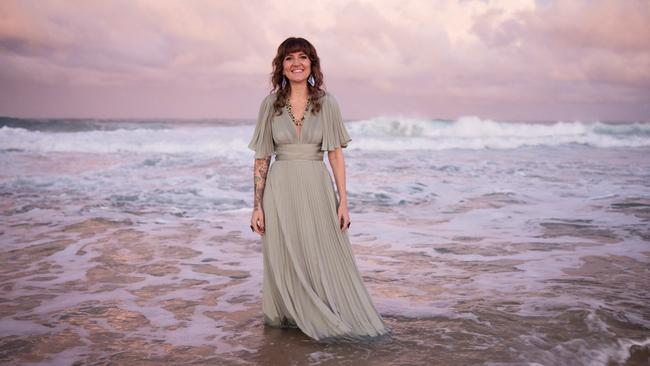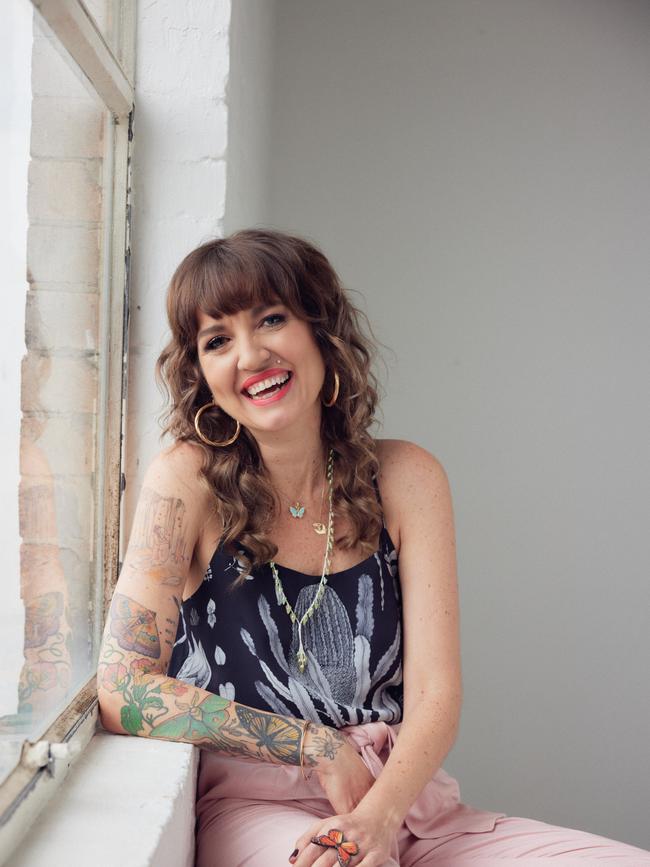The power of one: ‘There were years of trauma in my body’
For author Holly Ringland, leaving Australia was a catharsis – and fame has followed.

Holly Ringland wrote her first novel, The Lost Flowers of Alice Hart, while living in Manchester, in the UK, with tiny needles of sleet hitting the winter windows. In that damp, deep cold, she burnt eucalyptus leaves on her desk and spread books with pictures of Australian wildflowers across the floor. She was, she has said, “writing myself home”.
Her childhood had been spent on the Gold Coast, running barefoot through her mother’s subtropical garden, feeling the salt on her skin; and at her grandmother’s home, where cane fields ran to the sea and the family gathered on warm evenings under a “sentient” mango tree.
She had always wanted to be a writer, but in her 20s and early 30s found herself strangled by a trauma she had not yet been able to talk about. She began to get “emotionally sick because I wasn’t writing in the way that my body needed me to be writing because I was too scared to even try”. There was a “hot coal of truth” sitting on her chest and “it felt sometimes like it was crushing me, choking and burning me”.
She had never said the words “male-perpetuated violence” out loud, but she had suffered it; it had nearly destroyed her.
Ringland walked away from a job as senior media officer of Uluru-Kata Tjuta National Park and from living in an Aboriginal community at the base of Uluru, barely able to function because of the abuse in a relationship, something she had hidden from everyone. She used her life savings to enrol at Manchester University for a masters degree in creative writing, saying: “I was trying to be happy, I was trying to survive, I was trying to be a good person.”
It wasn’t until she was away from Australia that she found “the courage to try to draw a story” from her experiences.
“That’s when I wrote the first draft of The Lost Flowers of Alice Hart,” she says. It was “breaking down walls of shame I didn’t even know I was living. I was so disconnected from myself; I had no idea that on the inside were just years of trauma in my body.”
In confronting the “sore place”, Ringland found her voice – and she roared. The profound connection to the Australian landscape, and the idea of a child speechless from trauma using the language of flowers, made the book an international bestseller. Ringland had turned the unspeakable into something poetic and beautiful. “The story I wasn’t telling didn’t control me anymore. I had sort of written it outside of my body and into something new,” she says.

The story will next year become an Amazon Prime series starring Sigourney Weaver as Alice Hart’s whisky-drinking, flower farmer grandmother. And Ringland has resumed writing: this month sees the release of her new book, The Seven Skins of Esther Wilding, set in Tasmania, Copenhagen and the Faroe Islands.
On a Zoom call, 42-year-old Ringland is a colourful character, waving her arms around, emotions close to the surface. Her new book was written not from a hard, cold place but from a sweet caravan called Frenchie in the garden of her parents’ home in the Gold Coast hinterland, after Ringland and her partner, Sam Harris, arrived from Manchester with two suitcases but got caught in the Covid-19 lockdown.
“I didn’t realise until I wrote Esther Wilding that writing Alice was cleaning my blood. Writing Esther Wilding has shown me who I am as a novelist,” she says.
The new book is concerned with grief – in particular, the way it “can just disorient people” – but also recovery.
Esther Wilding is numb with grief after her older sister, Aura, purposefully disappeared into the sea. After finding Aura’s journal, in which there are seven fairytales along with cryptic verses that she also had tattooed on her body, Esther is sent by her father to find out what happened to her.
Following the trail of the myths and stories Aura has left behind, there is a sense of Esther always trying to catch up with the shining older sister.
It is a mythological journey as much as an unfolding mystery, full of symbols.
“I’m descended from Scandinavian and Celtic people,” says Ringland. “I remembered how it felt to be a kid at my granny’s table listening to stories about my Scandinavian ancestors, intermingled with folktales and fairytales.”
Ringland spent a lot of time dreaming the story before she started writing. The Seven Skins of Esther Wilding is a magical, witchy, quirky, luminous book, full of the natural world, the night sky and the ever-changing water around the islands on which it is set, with Ringland saying it is also “a love letter to our oceans”. Esther recalls a 13th birthday when the family goes camping to try to see bioluminescence. When she finds it, “the sea lights up around her, neon blue ... she runs into the sea, causing blue light to scatter ... the stars are in her hair and on her skin”.
Some of the stories she talked out with Harris, whom she met on her fourth day in Manchester, and who joins her now in her imaginative world.
“All of a sudden my world opened up, and this human being with a beautiful brain knew about these people that I knew about,” Ringland says. “We developed a shorthand. It is just the joy of being able to have the blessing of somebody who cares about this world that doesn’t exist, but does exist because it is occupying all of my waking and dreaming moments.” They take the stories out for walks “and in that physical movement, the words come”.
Now that The Seven Skins of Esther Wilding is on its way out into the world, Ringland feels that “the river has started running”. “So, there is a beautiful, restful place in my mind that is filled with daydreams,” she says. “And I have learnt enough now to know that is where the story starts. So, I trust them – and they’re a beautiful place to spend time.”
Susan Chenery is a writer based in the Northern Rivers region of NSW. The Seven Skins of Esther Wilding by Holly Ringland (HarperCollins) is out now.



To join the conversation, please log in. Don't have an account? Register
Join the conversation, you are commenting as Logout